Dear Florida Climate Center Friends,
We'd like to present you with the February 2014 edition of our newsletter. In this newsletter, you'll find our monthly climate summary, a list of special events that our staff attended, some pictures, and more. If you have any questions, please email us at climate@coaps.fsu.edu.
Thanks,
The Staff of the Florida Climate Center
 |  |  | David Zierden
State Climatologist | James O'Brien
Professor Emeritus | Melissa Griffin
Asst. State Climatologist |
|
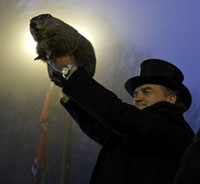
Groundhog Day 2014
On February 2nd, Punxsutawney Phil, the world's most famous weather forecasting groundhog, made his prediction for the upcoming spring. Phil has spoken, and, according to his prediction, we are looking at six more weeks of winter.
Since 1886, the groundhog has predicted an early spring only 17 times and has an accuracy of roughly 40%. You can read more about Phil and how his 'forecasts' compare to observations at:
http://www.ncdc.noaa.gov/special-reports/groundhog-day.php
If you are interested in predictions of temperature and precipitation over the next two weeks or out to three months, NOAA's Climate Prediction Center has a variety of maps showing the forecasted trends:
http://www.cpc.ncep.noaa.gov/
|
January Climate Summary for Florida
|
|
State Climatologist Addresses Directors of USDA Climate Program
Our partners at the University of Florida hosted a meeting of the U.S. Department of Agriculture's Climate Program projects on January 7th and 8th in Gainesville, Florida. The USDA administers the climate program through their National Institute of Food and Agriculture, and there are many regional projects funded under this envelope. The Florida Climate Center is a partner in the project "Climate Variability to Climate Change: Extension Challenges and Opportunities in the Southeast USA," which is led by University of Florida and involves several other universities in the Southeast.
The directors of these regional projects met in Gainesville to review progress and coordinate activities among the different regions and commodities. State Climatologist David Zierden addressed the group as the featured speaker for the lunch banquet. There, he presented on the record-setting wet summer of 2013, climate variability in the Southeast, and the outlook for the remainder of the winter and spring. The following day, he helped the Southeast team host a field trip to the Plant Science Research and Education Unit in Citra, Florida, which highlighted the activities of our project and what we have learned.

|
|
4-H Weather and Climate Toolkit Complete
After 2-years of planning and development, Assistant State Climatologist Melissa Griffin and Northwest Regional Specialist 4-H Agent Ms. Heather Kent released a toolkit that will help 4-H agents and volunteers teach the basics of weather and climate to middle school youth. This joint effort, under the USDA/NIFA Climate Education through Extension grant, was highlighted at the 4-H Youth Development Institute in Ocala, FL, on January 16th. During an extended session, Ms. Griffin and Ms. Kent spent time discussing the goals of each unit of the toolkit and demonstrated a variety of the hands on activities geared to teach about the importance of weather and climate. The program is currently being piloted in 22 counties across the state.
|
|
Children's Day
Assistant State Climatologist Melissa Griffin took part in the Museum of Florida History's Children's Day Outreach Event in Tallahassee, FL, on January 25th. Along with student volunteers and fellow Florida Climate Institute colleague Meredith Field, Ms. Griffin demonstrated how clouds form, the impacts of pressure changes, Bernoulli's Principle, and density properties of various liquids.
|
|
Upcoming Events
February 2-6, 2014:
February 14, 2014:
Cotton Expo in Dothan, AL
Science Saturday in the Park at Railroad Square Art Park in Tallahassee, FL
April 1-3, 2014:
Southeast Regional Climate Center Technical Advisory Committee Meeting in Raleigh, NC
|
|
Winter Weather Pictures from Florida
January 2014 brought some colder air than we've seen in the last few years to the state, and with it, the chance to take some beautiful pictures from this winter. Here are some pictures we received from across the northern part of the state taken during last month.
When arctic air invaded the state on the 7th of January, the high in Tallahassee was only 35˚F. The cold temperatures allowed for some amazing pictures to be taken of the fountains from around the campus of Florida State University. The interesting thing is both of these pictures were taken at 2pm.
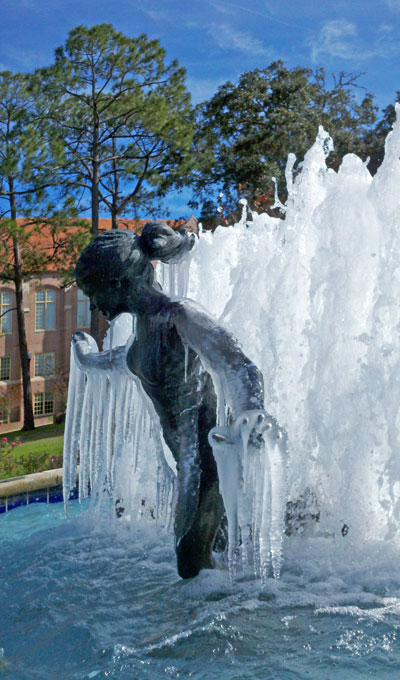 | | Credit: S. Freese |
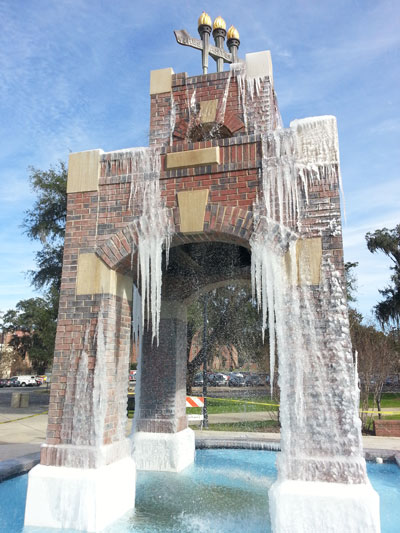 | | Credit: M. Kozar |
At the end of the month, the northern part of the state experienced a winter weather event that produced an inch of snow in Pensacola, sleet across most of the Panhandle and freezing rain that closed over 200 miles of I-10. Here are just a few pictures form the region during the 28th and 29th.
Freezing rain coated the town of Crestview before changing over to sleet, with some minor accumulations.
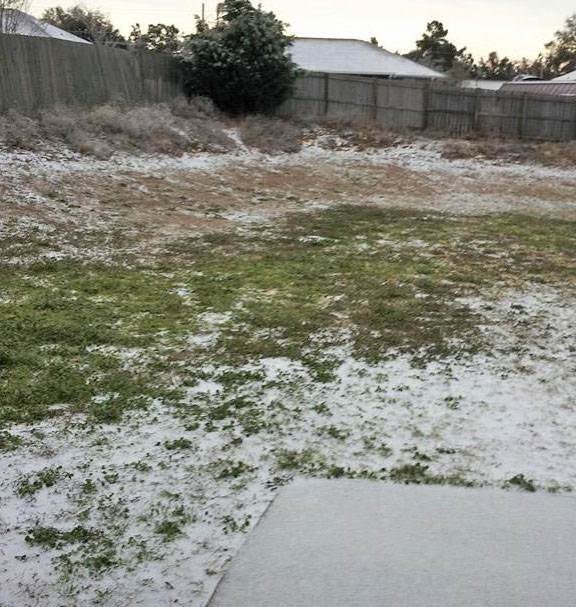 | | Credit: K. Chong |
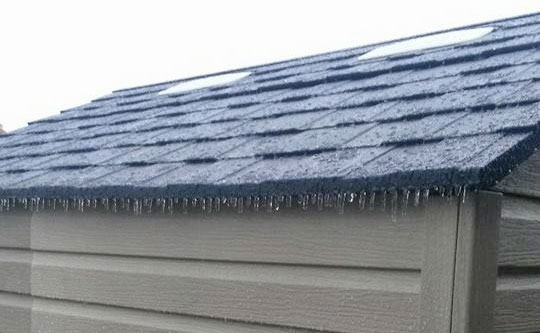 | | Credit: K. Chong |
Areas closer to the coast, Niceville and Freeport saw mainly freezing rain which accumulated on all surfaces- including roads, bridges, buildings, cars, signs and trees.
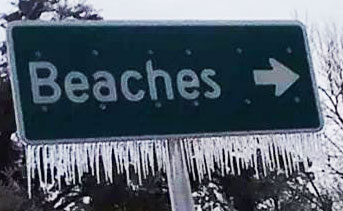 | | Credit: M. Maris |
 | | Credit: C. LiA |
Due to widespread freezing rain, the Florida Highway Patrol blocked off access to east and westbound I-10 from the Florida/Alabama line to just east of Tallahassee.
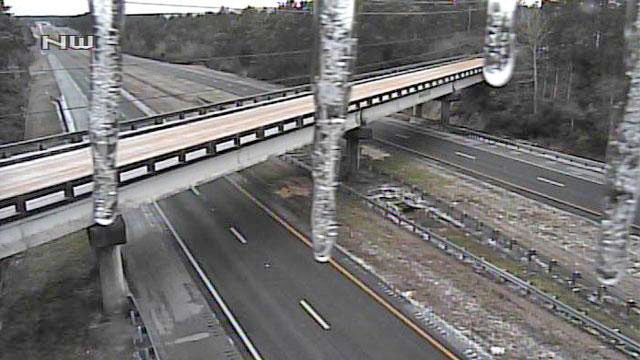 | | Icicles hang off FLDOT camera along I-10 at Beluah Road in Escambia County. |
|
|
About Us
The Florida Climate Center is part of a three-tiered system of national, regional, and state climate offices, including NOAA's National Climatic Data Center and the Southeast Regional Climate Center. The Florida State Climatologist and other staff at the Florida Climate Center provide the following information and services to the people of Florida:
· Climate Data:
Historical weather observations for weather stations throughout the state of Florida. We are able to provide data for most stations from 1948-present.
· Climate Information:
Long-term historical averages for various stations, climate divisions, and the entire state.
· Extreme Event Records:
Information and analyses on extreme events such as freezes, droughts, floods and hurricanes.
· Special Analysis:
With their vast knowledge of El Niņo, La Niņa and climate variability, the State Climatologist and staff can offer expert insight into Florida's climate trends.
· Outreach:
Activities, presentations, and workshops that inform and educate the people of Florida about current and emerging climate issues. We also coordinate volunteers for the Community Collaborative Rain, Hail & Snow Network (CoCoRaHS).
More About Us
|
|